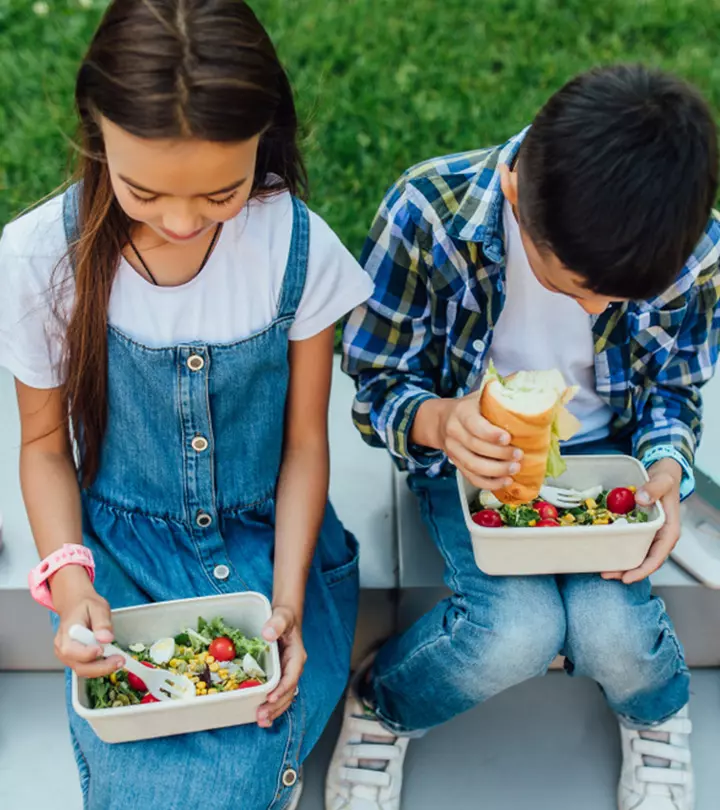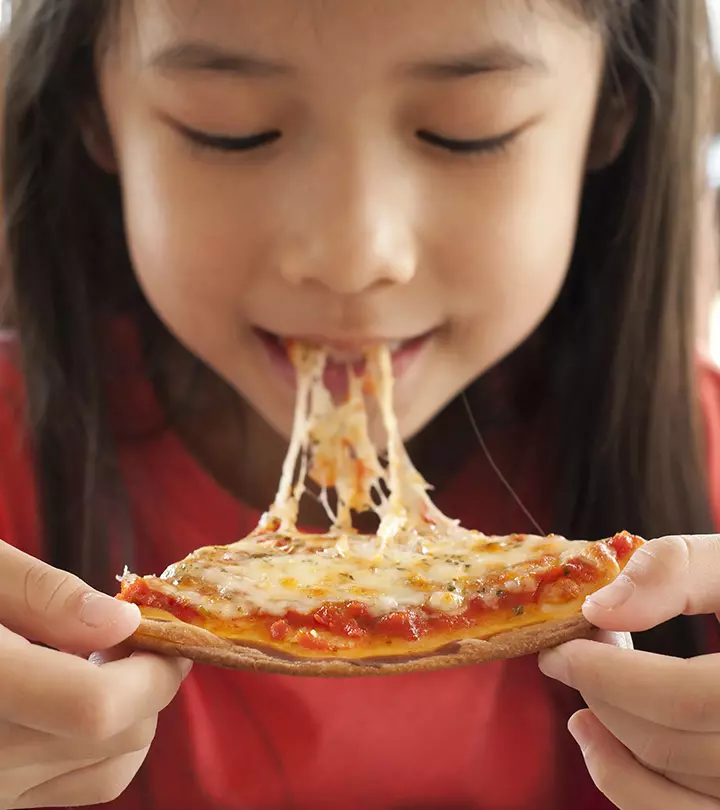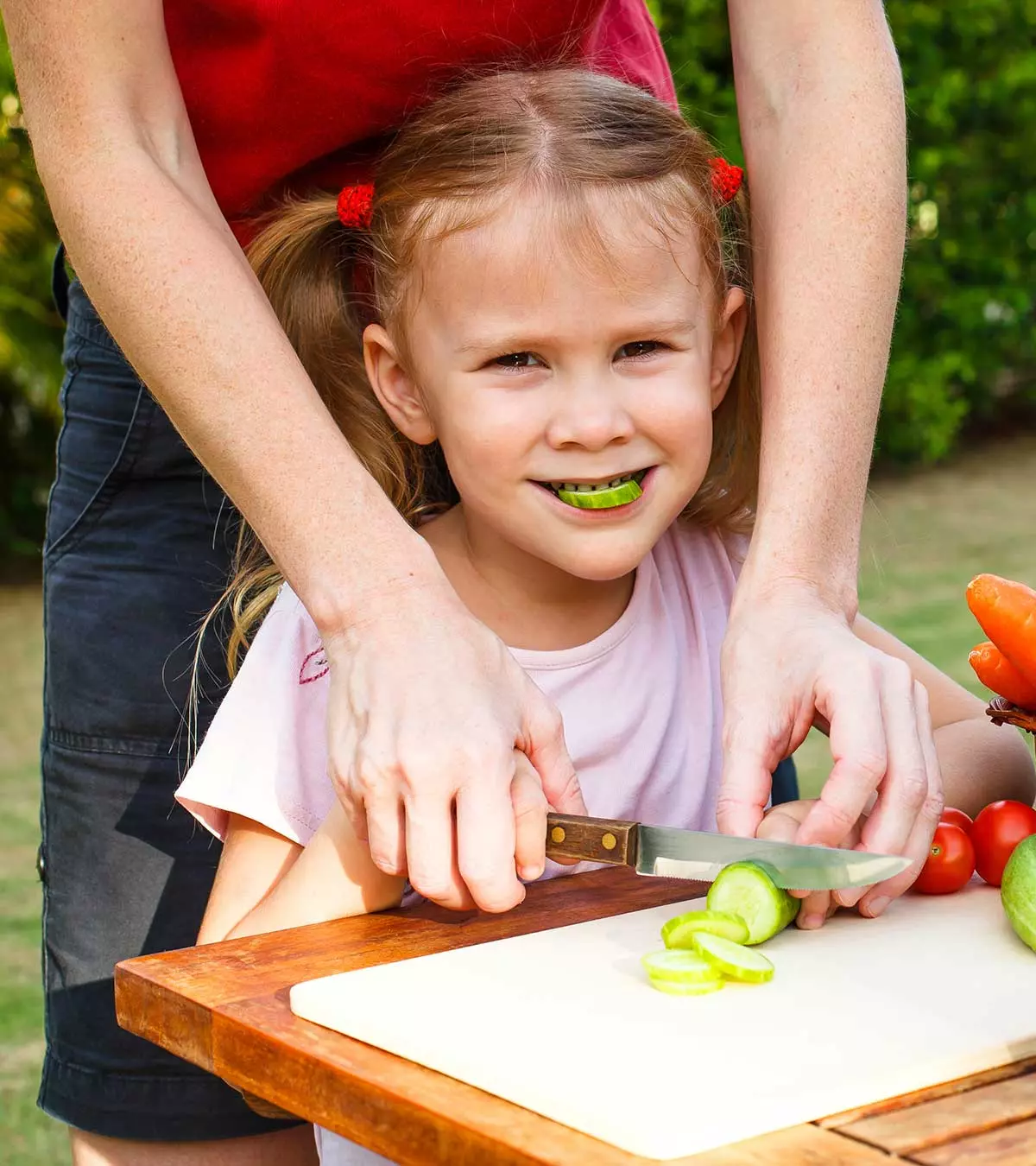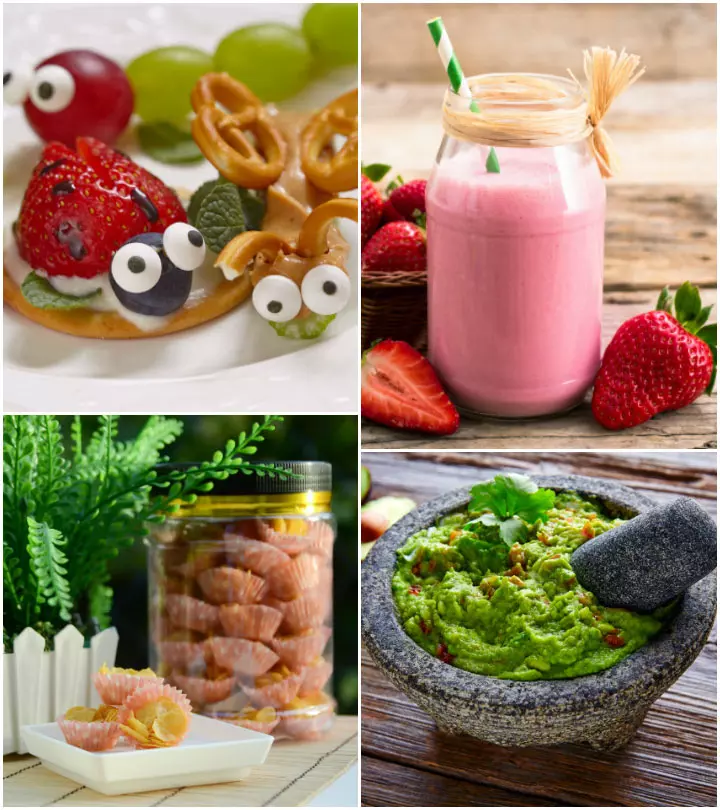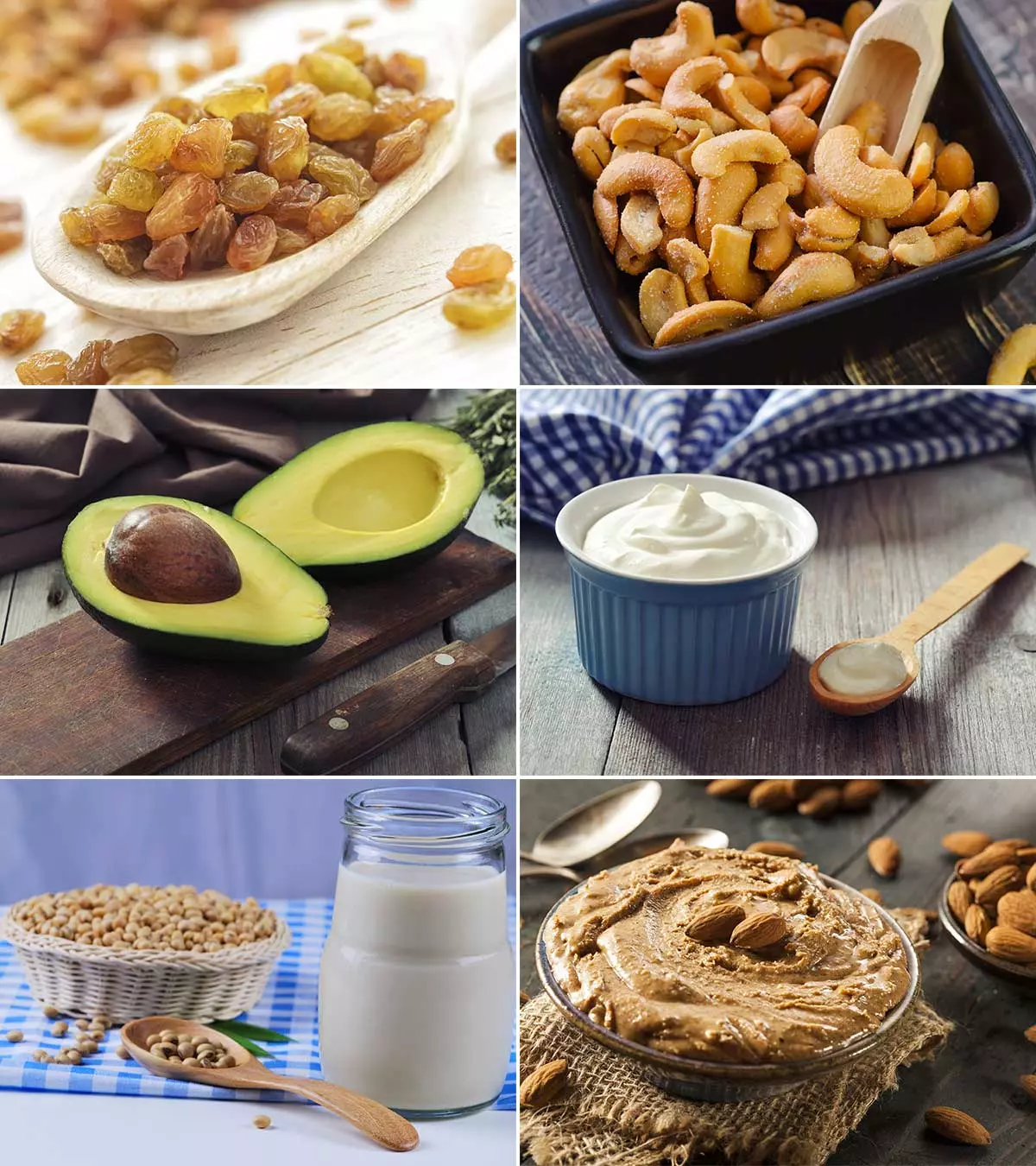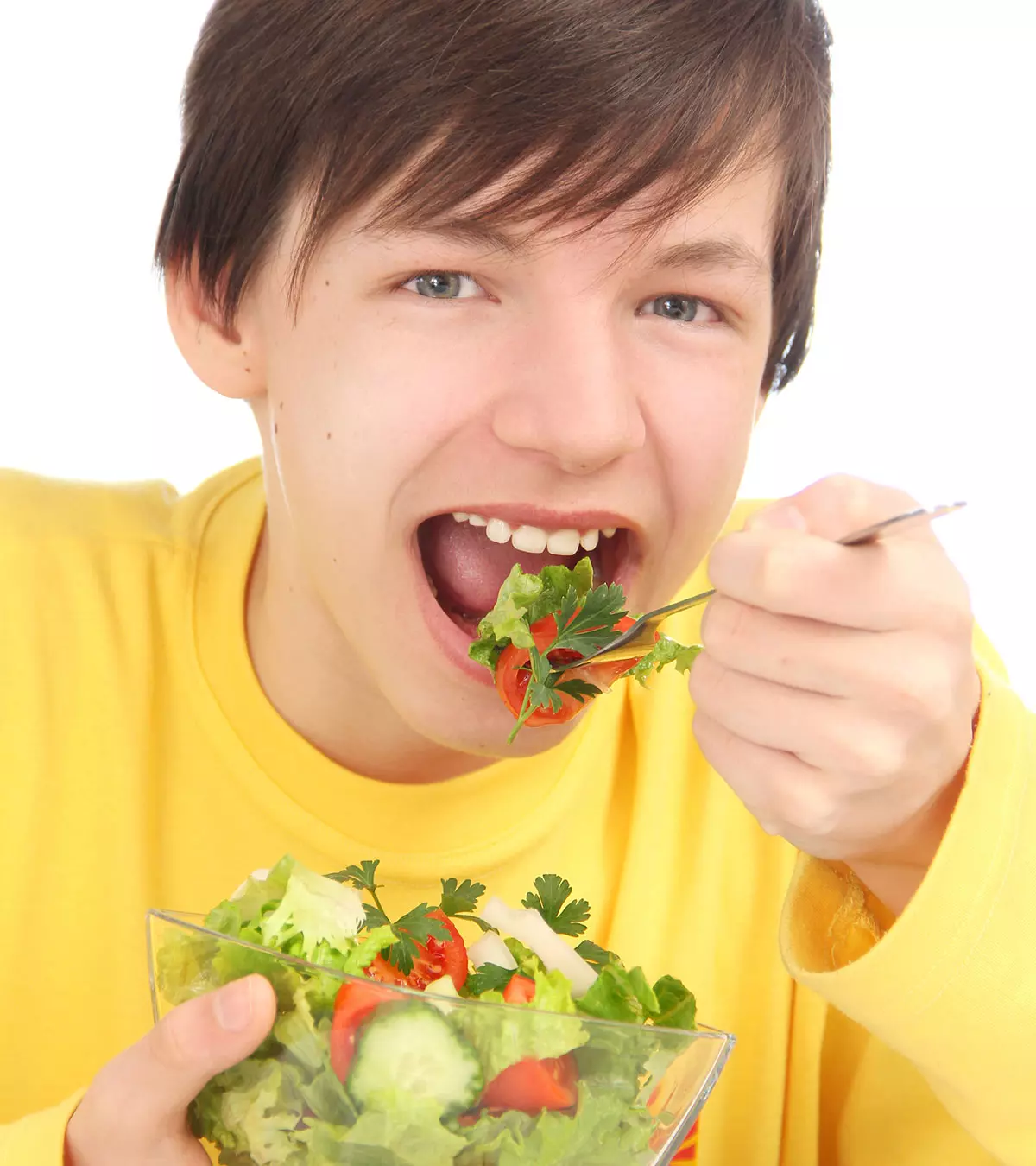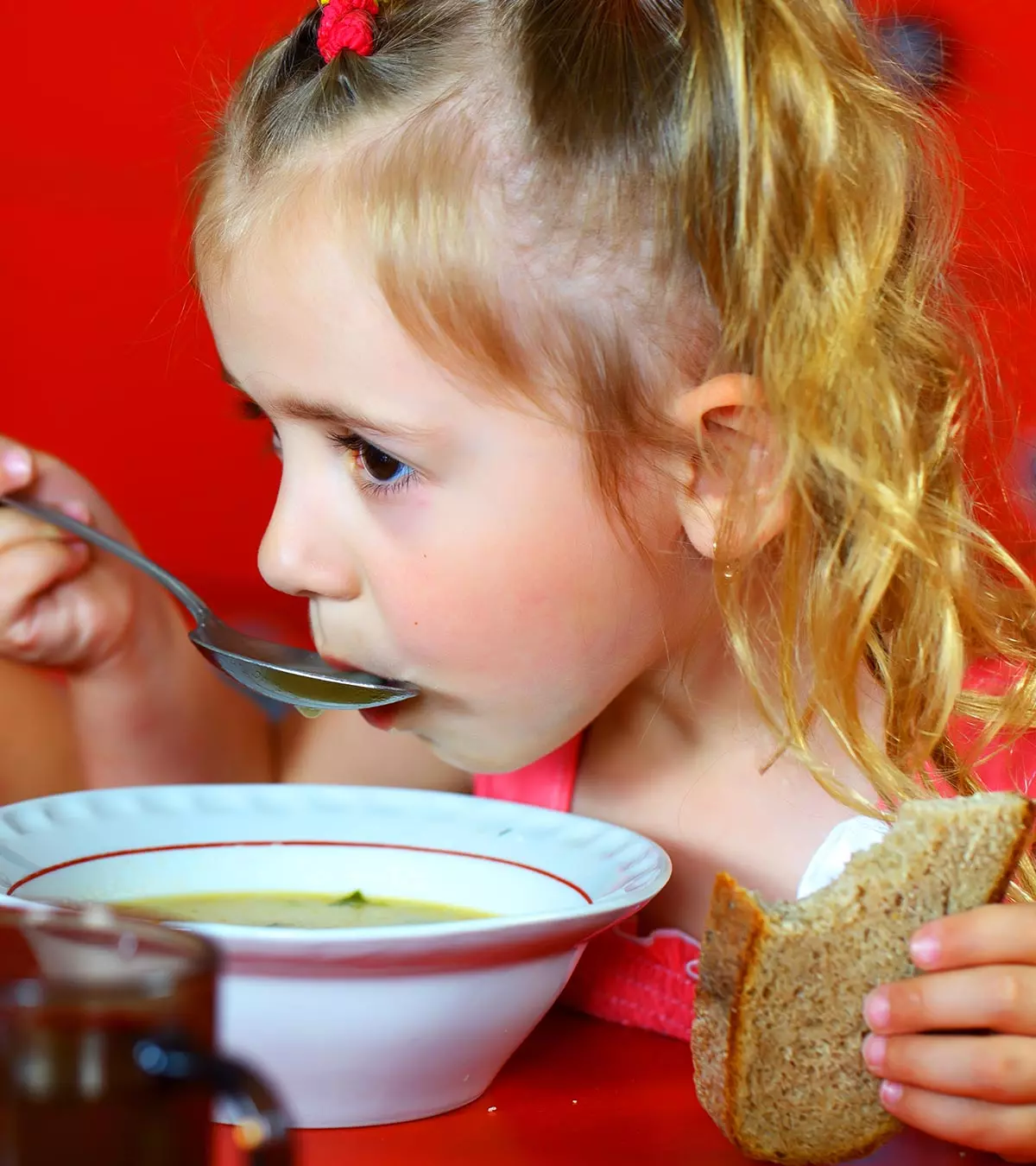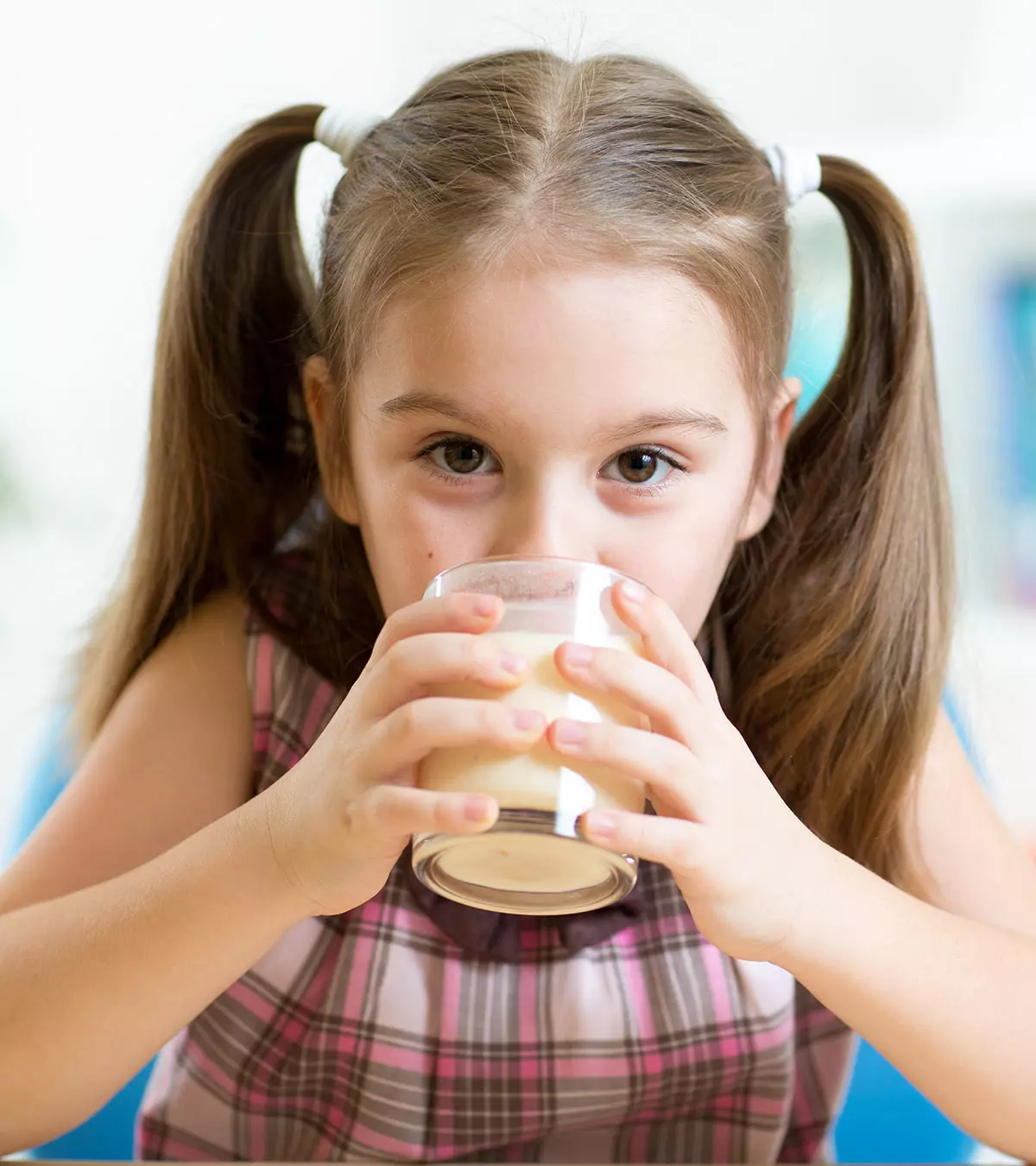
Image: ShutterStock
Watermelons for kids make for a delicious summer snack. In addition, there are various health benefits of eating watermelon. The fruit is high in essential nutrients and contains 92% water, which can help your child stay hydrated during the summer (1). It can also be used as baby food, but make sure to remove all of the seeds before giving them to your child. Read on to learn more about the health benefits of watermelon and some child-friendly watermelon recipes.

Key Pointers
- Watermelon is composed of 92% water, making it an excellent source to keep children hydrated.
- Watermelon is a rich source of vital nutrients and vitamins (A, B1, B6, C), which help regulate blood pressure, prevent muscle pain and asthma in children, and fight the heat.
- Watermelon is also beneficial for a child’s digestion, skin, eye and heart health, and immunity.
- Overconsumption of watermelon can cause nausea and gastric troubles in children.
- Watermelon is best consumed during summer and can be served in the form of juices and salads.
Nutrients In Watermelon
Beyond being a refreshing summer treat, watermelon provides a variety of nutrients that support good health. Here is the breakdown of the various nutrients in watermelon, along with their health benefits (1) (2) (3):
- Lycopene: It is an antioxidant that may help maintain a healthy heart and bones. It can combat free radical damage and prevent cellular damage.
- Vitamin A: This Vitamin is good for the eyes and skin (4).
- Vitamin B1: This Vitamin helps the body to use food to get energy (5).
- Vitamin B6: Helps in fighting infections (6).
- Vitamin C: This Vitamin makes the immune system stronger thereby keeping your child from falling sick (7).
- Citrulline: It is an amino acid that converts to arginine. This amino acid can help promote healthy blood circulation and regulate blood pressure (8).
 Did you know?
Did you know?Health Benefits Of Watermelon For Kids
Watermelons have a plethora of health benefits. Here are some of the amazing things that watermelon can do for your children (1) (3) (9) (10) (11).
- Hydration: One cup (152g) of diced watermelon contains 139g of water, which can help children stay hydrated, especially during hot weather and after exercise (2). You can give a cup of watermelon balls or a big slice of watermelon to your child to beat the thirst.
- Digestion: Watermelon isn’t a rich source of fiber. However, it still provides some soluble fiber and plenty of water that can support healthy digestion. It also contains an enzyme called citrulline, which may help reduce inflammation and improve overall digestion.
- Weight management: Watermelon can help children feel full, which can prevent over-eating and help maintain a healthy weight. A study assessed the association between watermelon consumption and its effects on different parameters. It found that “Reductions in body weight, body mass index (BMI), and blood pressure can be achieved through daily consumption of watermelon, which also improves some factors associated with overweight and obesity (12).”
- Inflammation and muscle soreness: Vitamin C and lycopene in watermelon possess robust antioxidant properties, which can fight free radical damage and reduce inflammation. Drinking watermelon juice after exercise may help reduce muscle soreness. A study found that athletes who consumed watermelon juice experienced less muscle soreness for up to 24 hours (13).

- Heart health: Watermelon is rich in water and potassium, which support healthy blood pressure levels. It is also a good source of several antioxidants, including lycopene, which may help improve cholesterol levels and regulate blood pressure.
- Blood sugar management: Watermelon has a high glycemic index but a low glycemic load. Hence, its moderate intake is suitable for children, especially those with sugar-related issues, as it won’t cause abrupt blood glucose spikes.
Watermelon seeds and rind also contain several nutrients, including fiber and magnesium. While rinds are lower in sugar and higher in fiber, watermelon seeds are rich in magnesium. You can stir-fry or pickle the rind. On the other hand, the seeds can be dried and roasted to make a crunchy snack or ground into a powder to add to smoothies and baked goods.
 Quick fact
Quick factSide Effects Of Eating Excessive Watermelon
Watermelon has several health benefits for your child. However, its excess consumption may have side effects. Here are some adverse effects of excess watermelon intake:
- Nausea
- Vomiting
- Stomach Bloating
- Diarrhea
- Indigestion
In addition to overeating, some children may need to limit or avoid watermelon due to specific health concerns (10):
- Migraine triggers: Watermelon contains tyramine, an amino acid that can trigger migraines in some children. Tyramine forms from the breakup of the amino acid tyrosine and is found in various foods, including aged cheeses and processed meats.
- Allergic reactions: Some children are allergic to grass or ragweed pollen and may have a cross-reactivity to watermelon. Symptoms can range from mild irritation to more severe reactions in rare cases.
- Blood sugar spikes: Natural sugars in watermelon can lead to blood sugar spikes, so children with diabetesiA lifelong condition caused by less or no insulin production leading to high blood sugar levels in the blood should eat it in moderation.
- Digestive issues: Watermelon is high in FODMAPs, a type of carbs poorly absorbed in the small intestine. Hence, its intake may cause bloating, constipation, or diarrhea in those with irritable bowel syndrome (IBS).
How To Serve Watermelon
According to Alicia Chacha Miller, registered dietician, “Watermelon is a hydrating and nutrient-rich fruit that can be a great addition to a child’s diet. A small wedge or about ½ to 1 cup of diced watermelon is generally an appropriate portion to start with for most young children.” However, if your budding champ make faces whenever you serve them watermelon, do not worry. These delicious watermelon recipes for kids can help you make you kids eat watermelon.
- Minted watermelon salad
Cut a quarter of the watermelon and put the pieces on the plate. Now add some amount of thin slices of red onion, half cup mint leaves. Sprinkle some salt and pepper on it and serve.
 Quick tip
Quick tip- Tomato and watermelon salad
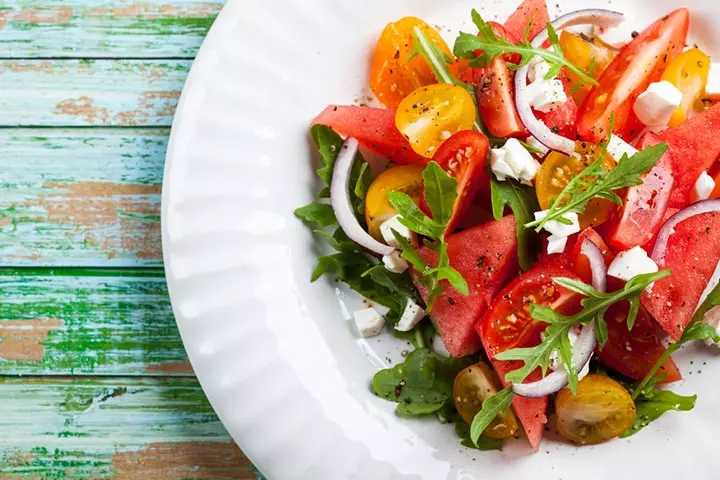
This salad is for all palates. If your kid is a finicky eater, then make them a salad of tomato pieces, watermelon cut into smaller chunks topped up with some onion. They surely will ask for some more!
- Watermelon slushie
Make a refreshing watermelon slushie for kids to cool off in the summer. Begin by putting frozen watermelon chunks into a blender. If the watermelon isn’t frozen, toss in a few ice cubes along with the chopped pieces. Add a splash of freshly squeezed lime juice for an extra kick of flavor. Blend everything until it turns into a smooth, slushy texture. If you prefer it sweeter, mix in a bit of honey or agave syrup. Once it’s blended just right, pour it into cups. You can even top it off with a watermelon slice or a sprig of mint for a nice touch.
- Watermelon juice
If your sweetie hates eating the melon, then try offering them some juice. Chop some seedless watermelon and add finely grated ginger to it. Now add some lime juice to the paste and blend all the ingredients well in a blender till the mixture becomes smooth. Now sieve the mixture into a glass and add mint leaves to garnish. Watermelon juice for kids is ready. Add some ice cubes and serve.
- Watermelon Pizza
Your child is bound to enjoy this fruity twist to children’s favorite fast food. Cut a disk out of the middle of a chilled watermelon, ensuring it is one inch thick. Add three tablespoons each of cream cheese and heavy cream, a teaspoon of lemon juice, half a teaspoon of vanilla, and a cup of honey or maple syrup to a blender. Drizzle the mixture over the disk, and top it with your child’s favorite berries and mint. Finally, cut the disk into slices and serve fresh.
- Watermelon cake
Another fun and visually appealing way to serve watermelon to children is by making a watermelon cake. Cut round slices of watermelon and layer them with a light cream topping. Decorate with sliced almonds, shredded coconut, or colorful fruits like blueberries. Slice and serve fresh for a refreshing, juicy dessert.
A mother of two and a blogger shares her experience making a watermelon cake for her son. She says, “Making a watermelon cake is pretty simple. I removed the rind and shaped three pieces into cake tiers. I secured the fruit decorations using toothpicks (i).”
- Watermelon Popsicles
This refreshing summer treat blends the goodness of sweet watermelon and the sourness of lime. Chop a medium-sized ripe watermelon and add it to a blender along with freshly squeezed lime juice. Blend the mixture until smooth and pour it into popsicle molds with half an inch of space at the top. Let it sit in the freezer overnight before you de-mold and serve.
Frequently Asked Questions
1. How much fruit should a child eat in a day?
Children between two and three years should eat one cup of fruit, those between four and eight years should eat one or one-and-a-half cups of fruit, and children aged nine to 13 should eat one and a half cups each day (15).
2. Does eating watermelon at night increase the weight of kids?
Over 90% of a watermelon’s weight is water; therefore, snacking on watermelon can keep one full for longer. Balanced consumption of watermelon, even at night, won’t lead to weight gain (16) (17).
3. Can I give watermelons to my kid during cold and fever?
Fruits containing vitamin C may be helpful for children with cold and fever. Watermelons contain vitamin C and antioxidants that may be beneficial for your child. Watermelons also help maintain hydration which is important when having a cold or fever (1) (18) (19).
4. What is the best way to store watermelon?
An unripe watermelon may be stored over the countertop, away from direct sunlight, while a ripe one may be stored in the refrigerator for two to three weeks. Alternatively, cut it into pie-shaped slices and wrap them in a cling wrap or store them in an air-tight container. Watermelon may also be cubed and flash-frozen over a parchment-lined baking sheet and later transferred to a storage bag.
Watermelons for kids are a healthy snack option for summers. The fruit is hydrating and tastes delicious, making it the ideal ingredient for summer recipes for kids. It primarily contains water and is highly nutritious. Before serving some to your little one, try getting rid of all the seeds. Consuming watermelon is highly beneficial in preventing specific health issues such as asthma and blood pressure. Also, it leaves glowing and healthy skin as it hydrates and boosts energy. You may try making it a habit for your child to eat watermelon and other seasonal fruits, as their nutrition is paramount.
Infographic: Advantages Of Eating Watermelon For Children
Watermelon is a popular summer fruit. Children of all ages relish the refreshing fruit, but did you know there are many advantages to consuming it? So, scroll through the infographic below to learn about the health benefits of watermelon for children.
Some thing wrong with infographic shortcode. please verify shortcode syntaxIllustration: Amazing Health Benefits Of Watermelon For Kids
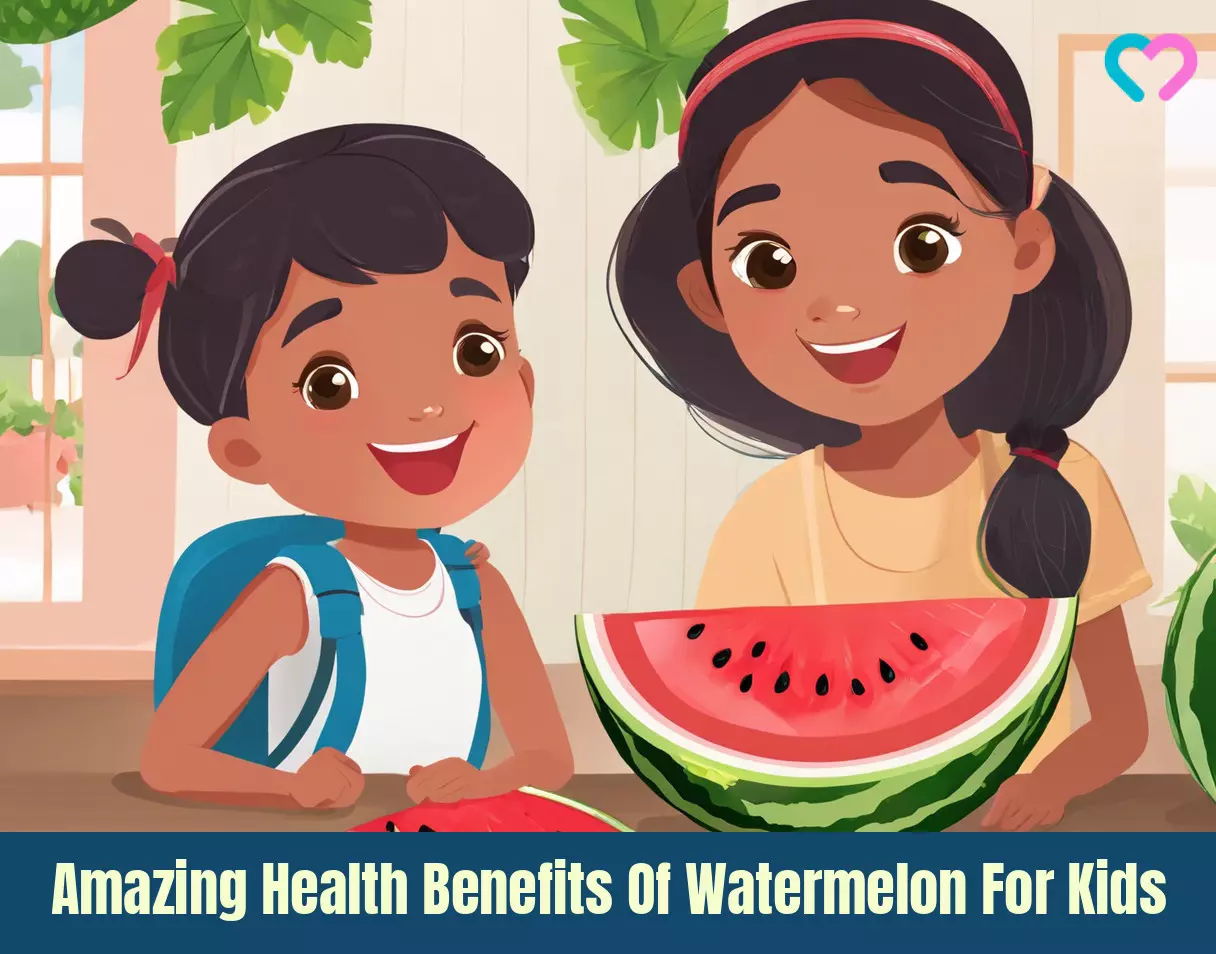
Image: Stable Diffusion/MomJunction Design Team
Personal Experience: Source
MomJunction articles include first-hand experiences to provide you with better insights through real-life narratives. Here are the sources of personal accounts referenced in this article.
i. Kids Love Watermelon Cakes;https://mykidseatplants.wordpress.com/2013/06/06/kids-love-watermelon-cakes/
References
- Surprising Health Benefits of Watermelon.
https://www.uaex.uada.edu/counties/miller/news/fcs/fruits-veggies/Surprising - Watermelon, raw.
https://fdc.nal.usda.gov/food-details/167765/nutrients - 11 Top Watermelon Health Benefits That Nutritionists Say Are Backed by Promising Research. https://www.nwhealth.edu/news/11-top-watermelon-health-benefits/
- Vitamin A.
https://www.umass.edu/nibble/infofile/vitamina.html - B vitamins and folic acid.
https://www.nhs.uk/conditions/vitamins-and-minerals/vitamin-b/ - Vitamin B6.
https://medlineplus.gov/ency/article/002402.htm - 5 Vitamins That Are Best for Boosting Your Immunity.
https://health.clevelandclinic.org/vitamins-best-boosting-immunity - What Is Citrulline?
https://health.clevelandclinic.org/citrulline-benefits - Numerous Health Benefits Found in Summer-Favorite Watermelon.
https://www.ars.usda.gov/news-events/news/research-news/2025/numerous-health-benefits-found-in-summer-favorite-watermelon/ - Why Watermelon Should Be Part of Your Diet.
https://health.clevelandclinic.org/benefits-of-watermelon - Fruit of the month: Melons.
https://www.health.harvard.edu/heart-health/fruit-of-the-month-melons - Changqi Liu and Mee Young Hong; (2019); Effects of Fresh Watermelon Consumption on the Acute Satiety Response and Cardiometabolic Risk Factors in Overweight and Obese Adults.
https://www.mdpi.com/2072-6643/11/3/595 - Martha P Tarazona-Díaz et al; (2013); Watermelon juice: potential functional drink for sore muscle relief in athletes.
https://pubmed.ncbi.nlm.nih.gov/23862566/. - Parkash Meghwar et al; (2025); Nutritional benefits of bioactive compounds from watermelon: A comprehensive review.
https://www.sciencedirect.com/science/article/abs/pii/S2212429224010393 - Progress on children eating more fruit, not vegetables.
https://www.cdc.gov/vitalsigns/pdf/2014-08-vitalsigns.pdf - Fruits That Can Help You Lose (or Maintain Your) Weight.
https://www.keckmedicine.org/blog/7-fruits-that-can-help-you-lose-or-maintain-your-weight/ - Tiffany Lum et al; (2019); Effects of Fresh Watermelon Consumption on the Acute Satiety Response and Cardiometabolic Risk Factors in Overweight and Obese Adults.
https://pmc.ncbi.nlm.nih.gov/articles/PMC6470521/ - Feeding Children When They Are Sick.
https://www.eatright.org/health/wellness/healthful-habits/feeding-children-when-they-are-sick - What To Eat When You Have the Flu.
https://health.clevelandclinic.org/what-to-eat-when-you-have-the-flu
Community Experiences
Join the conversation and become a part of our nurturing community! Share your stories, experiences, and insights to connect with fellow parents.
Read full bio of Dr. Sonal Dhemla
- Alicia Chacha Miller is a registered dietitian specializing in maternal and pediatric nutrition. She holds an MS in Nutrition Science from the University of Southern California and founded Cardamom Nutrition.
 Alicia Chacha Miller is a registered dietitian specializing in maternal and pediatric nutrition. She holds an MS in Nutrition Science from the University of Southern California and founded Cardamom Nutrition.
Alicia Chacha Miller is a registered dietitian specializing in maternal and pediatric nutrition. She holds an MS in Nutrition Science from the University of Southern California and founded Cardamom Nutrition.
Read full bio of Sindusha MS
Read full bio of Swati Patwal
Read full bio of Dr. Joyani Das








